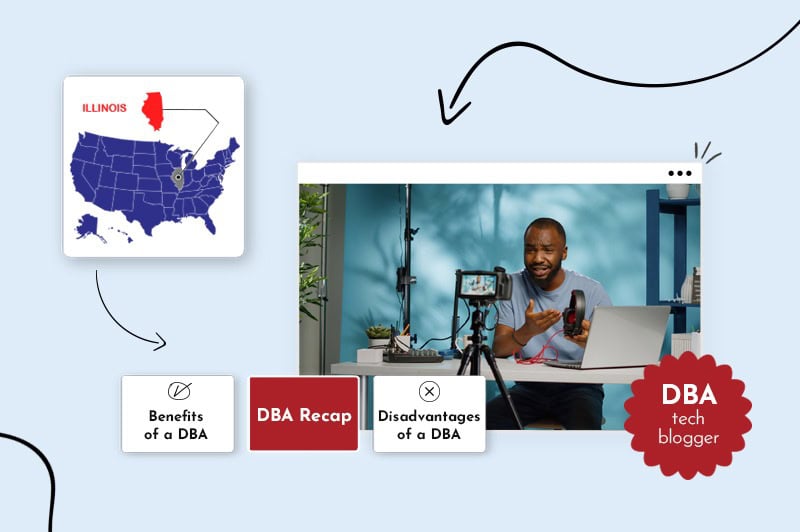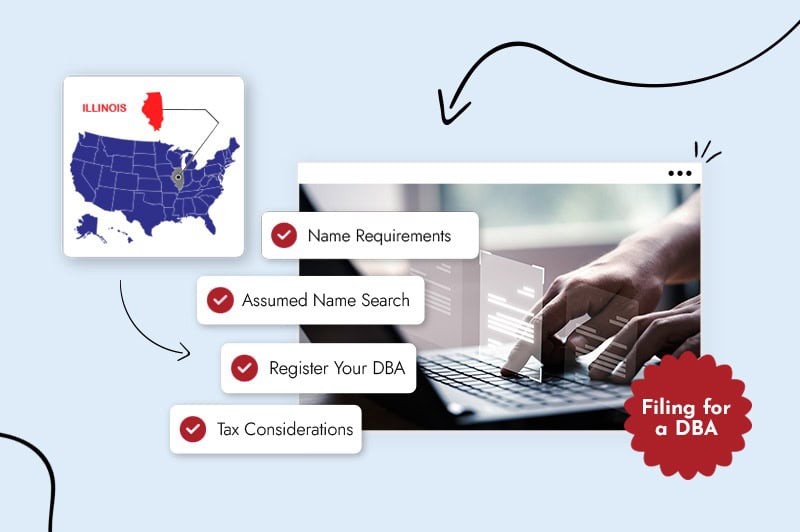When you start your own business, you need to give it a name. This is true whether you will be doing business as a limited liability company (LLC), corporation, partnership, or sole proprietor. Having a business name helps separate commercial assets and activities from your personal finances. It allows your company to build a brand while gaining name recognition and goodwill. When you form a business entity like an LLC in Illinois, you must choose a name for it. Another way to secure a name is to register an assumed business name, also known as a DBA (“doing business as”). This ensures that no one else may use that name in Illinois. By itself, however, a DBA offers no other business benefits, such as the liability protection that comes with forming an LLC. Read on to learn more about DBAs in Illinois.
What is a DBA (“Doing Business As”)?

A DBA is a business or trade name that you may use after registering it with the state of Illinois. It can apply to any type of company. You may apply to register an assumed business name for a sole proprietor, partnership, LLC, corporation, or other entity.
Benefits of a DBA
Privacy
Registering a DBA enables you to secure the use of a brand name even if you do not have a business entity. If you are operating as a sole proprietor, for example, a DBA allows you to open a bank account and engage in other commercial activities without putting your personal name on everything. This can have privacy-related benefits.
No need for an EIN
If you run your business as a sole proprietorship using a DBA, you do not need to request an employer identification number (EIN) from the IRS. You can use the certificate of assumed or fictitious name to do things that would otherwise require an EIN, such as opening a commercial bank account. The same is true if you have a single-member LLC with no employees. You might still want to get an EIN, but it is not mandatory.
Diversifying your business
A company can use DBAs to identify specific products, services, or other business activities. Suppose, for example, that your LLC provides two unrelated services with different markets. A DBA can help you build separate brand recognition in each market without having to form separate business entities. You could engage in one activity under the official LLC name and another under a DBA. You can even register several DBAs for multiple activities or markets.
Registering as a foreign business
Illinois restricts the types of names you may use for an LLC organized in this state. For example, you cannot use words indicating that the business provides certain financial services without government approval. A foreign LLC, meaning one organized in another state, might have a name that is acceptable in the other state but not in Illinois. If the LLC wants to apply to the secretary of state for permission to do business in Illinois, it must also apply to use a DBA that complies with state law.
Disadvantages of a DBA
The main downside of using a DBA instead of forming an LLC is that you will have no liability protection. An LLC protects you from liability for business debts. If someone sues your LLC, they can claim the LLC’s assets. Your personal assets are mostly likely safe. The same is true if someone sues you as an individual. It would be much harder for them to touch anything owned by the LLC.
When you use a DBA without forming an entity like an LLC, you are still conducting business as an individual. This is also known as sole proprietorship. The DBA is just a fictitious name that you can use instead of your actual name. You have no legal protection against personal liability for your business.
Is having a DBA in Illinois a must?
Illinois law does not require you to obtain a DBA in order to operate a business. Whether you need a DBA or not depends on your business strategy.
If you do not have a business entity like an LLC, a DBA can protect your privacy by letting you use a name for your business that is different from your own name. It can help you establish a brand and build goodwill.
A DBA can offer a range of benefits for an LLC or other business entity. As mentioned above, one way to use DBAs is to establish different brands for each business activity or market. For example, you might start an LLC in the Chicago area. You later decide that you will expand into other parts of the state, but you want to create a separate business identity that is not so connected to Chicago. You can use a DBA to establish a business presence in another part of Illinois that is geared toward that area.
Filing for a DBA in Illinois

Name requirements
An LLC’s assumed business name must follow the same requirements as official LLC names, except that the assumed name does not need to have a suffix indicating that it is an LLC. The name cannot duplicate or be confusingly similar to a name that is already in use by another Illinois business as an official name, DBA, or reserved name. The name cannot contain profanity or other words that the general public would consider offensive.
Begin with Illinois assumed name search
You can search available names on the Illinois Secretary of State’s website to make sure the desired name has not already been taken. This search is available free of charge.
Register your Illinois DBA
As long as your LLC is in good standing with the secretary of state, you may file an application for an assumed name electronically. Otherwise, you can file by mail.
The fee to register an assumed name is $30 per year, but the secretary of state’s method for charging this fee can be confusing. An initial DBA registration may be valid for up to five years, and each renewal is for a five-year period. Each period begins in a year that is divisible by five. The length of your first DBA registration, as well as the fee you must pay, depends on when you apply.
DBA registration in Illinois expires on the first day of the DBA’s anniversary month in the next year divisible by five. For example, if you registered your DBA in July 2024, it will expire on July 1, 2025. If you filed in December 2026, it will expire on December 1, 2030.
The filing fee for a DBA takes the length of time remaining in the current period into account. It is based on the year in which you apply:
- $150: Years ending in 0 or 5
- $120: Years ending in 1 or 6
- $90: Years ending in 2 or 7
- $60: Years ending in 3 or 8
- $30: Years ending in 4 or 9
When your first DBA term ends, every subsequent term will last five years and require the payment of a $150 fee.
The fee to change your DBA is $25. You may cancel a DBA before the expiration of the term by paying $5.
File online
You can file an application for an assumed business name on the internet at the Illinois Secretary of State’s online portal. You may also change or cancel a DBA online. You can pay the filing fee with any major credit card (plus a processing fee).
File by mail
You may use Form LLC-1.20 to establish, change, or cancel a DBA by mail. You must file by mail if your LLC is not in good standing with the state for any reason, such as the failure to file an annual report. You can use a check payable to the secretary of state to pay the filing fee.
Send an original signed form and one copy to the following address:
Secretary of State
Department of Business Services
Limited Liability Division
501 S. Second St., Rm. 351
Springfield, IL 62756
If you have questions for the secretary of state’s office, you can reach them at 217-524-8008 on weekdays from 8:00 a.m. to 4:30 p.m. Central time.
Consequences for operating with a DBA without registration
The secretary of state assesses a penalty of $100 if you apply to renew an assumed name after the deadline. Sixty days after the deadline, the secretary of state will cancel the registration. This means that you will no longer have the legal right to use the name for your business.
Using a DBA without registration can have significant legal consequences. Consumer protection laws, for example, prohibit a business from misrepresenting its business structure or status to the public. If you are a sole proprietor and use an unregistered DBA that suggests you are an LLC or corporation, you could be liable for civil fines and damages. In extreme cases, using a DBA without registration could constitute fraud and potentially result in jail time.
Tax considerations
Using a DBA for your company does not change the way your income or property is taxed. A DBA is just a fictitious name, not a business structure.
Conclusion
Assumed names offer a variety of benefits, especially if you have organized your business as an LLC or a similar structure. You must register the name, though, which requires you to make sure it complies with state law. You also need to renew the registration in years ending in zero or five. Tailor Brands can help you stay in compliance with these requirements. If you need more information about how to start an LLC in Illinois or our assistance in the process, please reach out.
